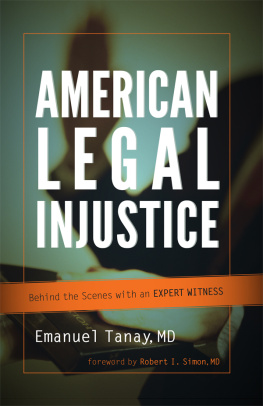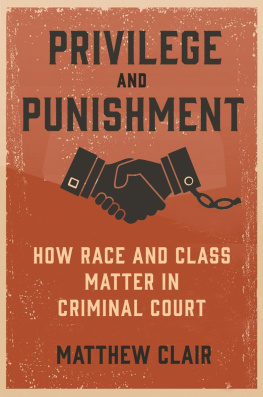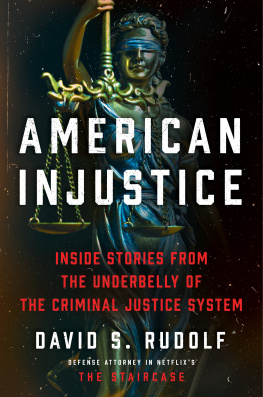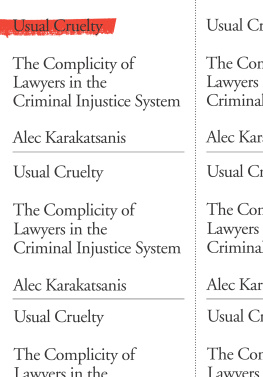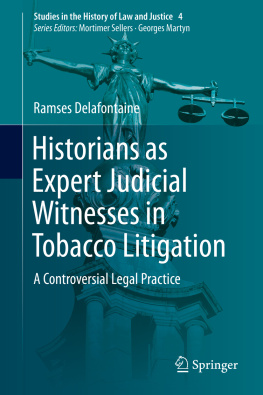Introduction
O nce, at a cocktail party, a lawyers wife asked me what a forensic psychiatrist does. Before I could answer, her husband self
righteously replied that forensic psychiatrists are called upon to
testify in cases of insanity defense and the effects of psychic trauma. I challenged the lawyer to name a single field of law in which I hadnt testified. He thought for a while and with a triumphant smile asked, How about zoning? When I cited zoning cases in which my testimony had been critical (in one, the plaintiffs charged the owners of a golf course bordering their property with causing them emotional distress by converting the golf course into a shopping center), he conceded that yes, I had testified in cases from A (airline disasters) to Z (zoning).
Lawyers often tell me that they remember my testimony because without you we could have never gotten the verdict. Naturally, I am pleased when my testimony leads to a favorable outcome for the side I have supported, but this is not always the case. The following letter shows the impact a forensic psychiatrist can make even on cases that did not turn out favorably for the side he supported. It was written by Commander William Pawlyk, who was convicted of two homicides. Pawlyk served for five years aboard the nuclear submarine the James K. Polk and had commanded Submarine Group 9 at Bangor. At the time of the homicides, he was the head of a reserve unit in Portland, Oregon. Pawlyk was sentenced to life in prison in spite of my testimony that he was not criminally responsible for the two homicides that he committed. I received the following letter from him after the trial:
June 30, 1991
Dr. Emmanuel Tenay[sic],
Thank you sir, and bless you for your sterling efforts on my behalf. Its true that you are an expert witness, but this is especially so because you bring together very humane qualities, with medical-psychiatric expertise, and courtroom experience.
Many of the things you said I found disturbing and difficult to hear, but I recognize their validity. You answered many questions for me, and gave me much food for thought and analysis.
I realize the impracticality of further one-on-one analysis because of distance, access problems, and cost, but I offer my case for any use you see fitin any way you desire. If you have need of more information that I can help provide in your future work please feel free to ask. That is the least I can do to show you my appreciation and gratitude.
I was amazed by your mastery of my case; in sharp contrast to the superficial, almost unprofessional basis used by Doctors Harris and Dunnet [the prosecutions experts]. With their strong, almost exclusive reliance on DSM-III criteria, neither one directly and rigorously pursued examining me for those indications. They based their opinions on lack of evidence which they sought indirectly and shallowly at best.
Their version of professionalism served only to elevate yours even more. There are very frightening aspects and consequences for others, if their approach is widespread. Indeed its frightening that it exists at all where peoples lives and treatment is at stake.... Yours is the most human and humane of the sciences. And you have shown me that you are among the most human and humane of its practitioners, as well as among the most knowledgeable and insightful. Again my most grateful thanks for your help at a time of utter desperation. No matter that the final legal outcome, you made possible the more important internal verdict within me. Thank you.
I have been a psychiatric expert witness in the trials of some famous defendants like Jack Ruby, Sam Sheppard, and Theodore Bundy; I was retained in the malpractice case against the psychiatrist who treated John Hinckley, Jr. Several of these high-profile cases are discussed in detail in the pages that follow. No less revealing, however, are the cases of defendants and plaintiffs whose names are not well known, such as Sterling Spann, an innocent man who spent years on death row whose case I describe later.
The story of how I became a psychiatrist and a full-time forensic expert is a long one, but Ill give you the short version here. My experiences as a Holocaust survivor from Poland implanted in me a commitment to the principles of justice. After the war I earned a medical degree from the University of Munich, and I later completed my psychiatric training in America. In 1958, I became an associate director of Detroit Receiving City Hospital Department of Psychiatry, which also served then as the hospital for the Wayne State University Medical School. I joined the faculty of Wayne State University as an assistant professor in the Department of Psychiatry and became clinical professor some years later.
I testified for the first time as a forensic expert in 1954 on behalf of Alice, a fourteen-year-old schizophrenic girl who was my patient at Elgin State Hospital in Illinois. Alice had drowned a four-year-old child and was charged with first-degree murder. Her homicidal behavior was an act of automatism that bypassed rational reasoning, yet Alice was charged with first-degree murder. Her pro bono lawyer had to rely on the testimony of a psychiatric resident whose command of English at that time was rudimentary and who had no courtroom experience.
I studied the legal and forensic literature and wrote an extensive report in which I argued that this was a case of insanity. My report was admitted into evidence despite the prosecutors objections, and to the surprise of all, my testimony led to the rare result of the judge directing the jury to find the defendant legally insane. One by one, other lawyers asked me to testify for their clients. A turning point in my career came when the attorneys defending Jack Ruby requested that I examine their client prior to his retrial for the murder of Lee Harvey Oswald (after Ruby had been sentenced to death following his conviction for Oswalds murder in March 1964).
I testified in nearly every state of the Union, from remote regions of Alaska to the courtrooms of Manhattan, including military court in Vietnam. In 1981 I testified in San Francisco in the trial of Rev. Jim Joness disciple Larry Layton for killing Representative Leo Ryan in Guyana. By 1980, my travels had become so disruptive that I gave up a successful and rewarding practice in psychoanalytic therapy and became a full-time forensic psychiatrist, though I continued to teach psychiatry.
I have testified in hundreds of different trials. In addition to criminal trials, I have been called on as an expert witness in countless personal injury lawsuits and legal and medical malpractice cases. I testified on behalf of a professional hockey player whose brain injury, sustained when another player clobbered him with a stick, was the result of a tendency by the teams management to encourage violence among its players. I also testified on behalf of a University of Michigan football player who charged the university with negligence in allowing him to graduate without the education that might have allowed him to get a job and function in society. I have testified in various federal courts and a number of military courts as well. I was the expert witness in the case of the marine Robert Garwood who was in Vietcong captivity for fourteen years and upon release was charged with being a deserter and collaborator.
As my time in the courtroom increased, I quickly realized several things that the average citizen may find surprising (I certainly did). For one, I learned that a person who is a suspect in a crime will most likely become a defendant and that once he or she is a defendant the chances of being convicted of a major crime are high; in fact, I found that the bigger the crime, the greater the likelihood that the defendant will be convicted, even if innocent. The implications of this are chilling. Criminal justice scholars often say that the true number of innocent people convicted of crimes is unknownin fact, unknowablebut a new University of Michigan study challenges that belief in one context, the death penalty. Among defendants sentenced to death in the United States since 1973, at least 2.3 percent of themand possibly morewere falsely convicted, said University of Michigan law professor Samuel Gross in a study coauthored by Barbara OBrien, a professor at Michigan State University College of Law.

